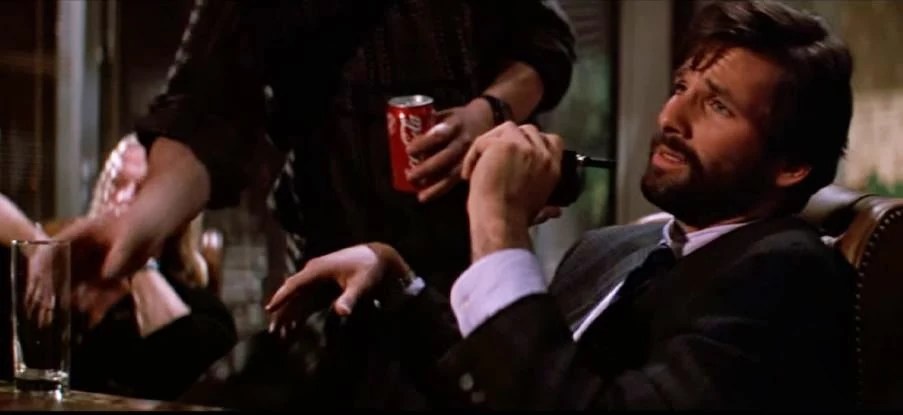Harry Ellis The Yuppie Nightmare of Nakatomi Plaza

Remember that slick, cocaine-fueled executive who tried to negotiate with Hans Gruber in Die Hard? That's Harry Ellis, a quintessential '80s yuppie whose arrogance and misplaced confidence ultimately led to his demise. He's more than just a minor character; he embodies the excesses and pitfalls of a specific era, serving as a cautionary tale wrapped in a designer suit.
Ellis's character resonates because he represents a particular cultural moment. The go-go '80s were a time of booming business, conspicuous consumption, and a certain brand of self-assuredness that bordered on hubris. Ellis, with his expensive clothes, slicked-back hair, and casual drug use, perfectly encapsulates this image. He believes he can manipulate the situation to his advantage, even in the face of a terrorist takeover. This ultimately proves to be his fatal flaw.
The portrayal of Harry Ellis in Die Hard wasn't just a random character choice; it was a reflection of the anxieties and social commentary surrounding the era. The film presents a stark contrast between John McClane's working-class heroism and Ellis's privileged, out-of-touch demeanor. Ellis’s attempts to negotiate with Gruber, driven by self-preservation and a desire to maintain his status, highlight the dangers of prioritizing personal gain over the well-being of others.
One of the most compelling aspects of Ellis's character is his unwavering belief in his own abilities. He’s convinced he can charm his way out of any situation, even a hostage crisis. This misplaced confidence, fueled by his success in the corporate world, ultimately leads to his downfall. He misjudges Gruber completely, failing to understand the gravity of the situation and the ruthless nature of the terrorist leader. His demise serves as a stark reminder of the limitations of superficial charm and the importance of situational awareness.
The impact of Ellis’s character extends beyond the confines of Die Hard. He has become a pop culture archetype, representing the quintessential '80s yuppie, a figure often associated with greed, excess, and a disconnect from reality. His iconic line, "Hans, bubby," has become shorthand for misplaced familiarity and misplaced confidence in the face of danger.
Ellis's backstory is hinted at throughout the film. He's a high-ranking executive at Nakatomi Corporation, accustomed to a world of power lunches, corporate deals, and extravagant parties. He sees himself as a master negotiator, a smooth operator who can talk his way out of any jam. This backstory, though not explicitly detailed, is crucial to understanding his motivations and his ultimate failure.
While Ellis doesn't offer any tangible benefits, his character serves as a powerful cautionary tale. We can learn from his mistakes, recognizing the dangers of arrogance, overconfidence, and a willingness to compromise one's integrity for personal gain.
There isn't a specific action plan related to Harry Ellis, but his character provides valuable lessons in social dynamics and crisis management. Observe how his attempts at negotiation backfire, and consider alternative approaches in similar (though hopefully less extreme) situations. Think about how humility and empathy might have changed the outcome.
Advantages and Disadvantages of Harry Ellis's Approach
| Advantages | Disadvantages |
|---|---|
| (Arguably) Initial confidence and perceived control | Extreme arrogance and misjudgment of the situation |
| Willingness to take action (albeit misguided) | Prioritization of self-preservation over others' safety |
Frequently Asked Questions about Harry Ellis:
1. Who played Harry Ellis in Die Hard? - Hart Bochner
2. What company does Harry Ellis work for? - Nakatomi Corporation
3. What is Harry Ellis's most famous line? - "Hans, bubby"
4. Why does Harry Ellis try to negotiate with Hans Gruber? - He believes he can manipulate Hans and save himself.
5. What happens to Harry Ellis? - He is shot by Hans Gruber.
6. Why is Harry Ellis considered a yuppie? - His attire, behavior, and values align with the '80s yuppie stereotype.
7. What is the significance of Harry Ellis's character? - He represents the excesses and pitfalls of the '80s yuppie culture.
8. What can we learn from Harry Ellis? - The dangers of arrogance, overconfidence, and prioritizing personal gain over others' well-being.In conclusion, Harry Ellis, though a supporting character in Die Hard, offers a compelling study in human behavior under pressure. His arrogance, fueled by the excesses of the '80s yuppie culture, ultimately leads to his downfall. While his story is fictional, the lessons it offers are timeless. By understanding Ellis’s mistakes, we can learn the importance of humility, empathy, and the dangers of overconfidence. He serves as a reminder that even in the face of extreme circumstances, maintaining one’s integrity and prioritizing the well-being of others is paramount. His character continues to resonate with audiences today, reminding us of the enduring power of well-crafted antagonists and the valuable lessons they can teach us about ourselves and the world around us. By analyzing characters like Ellis, we can gain a deeper understanding of human nature and the consequences of our choices.
Decoding the trend sad anime profile pictures
Farrow and ball sverige upscale paint hits scandinavia
Kedah zakat online streamlining religious obligations in the digital age













